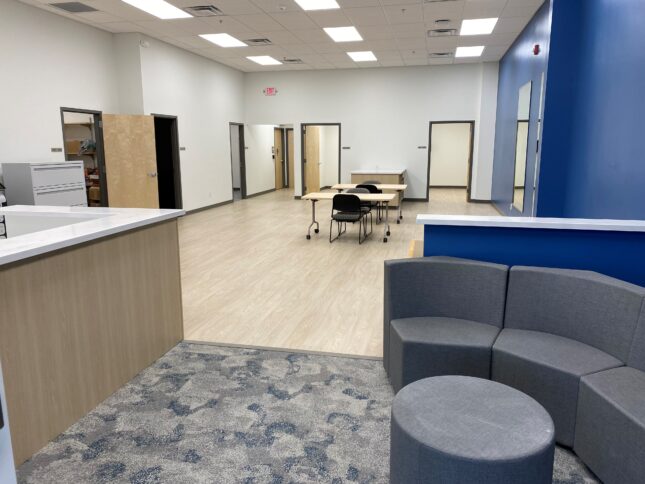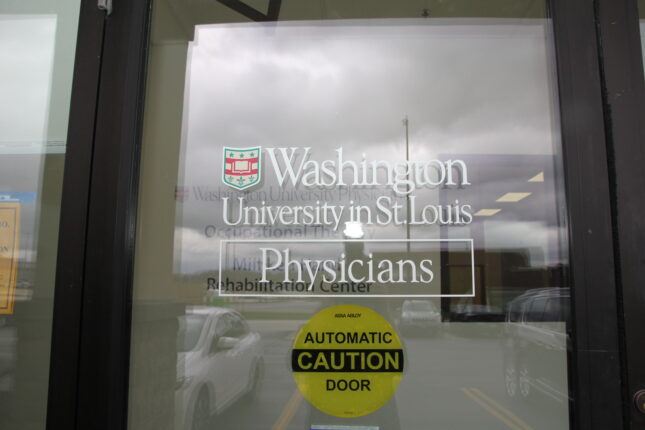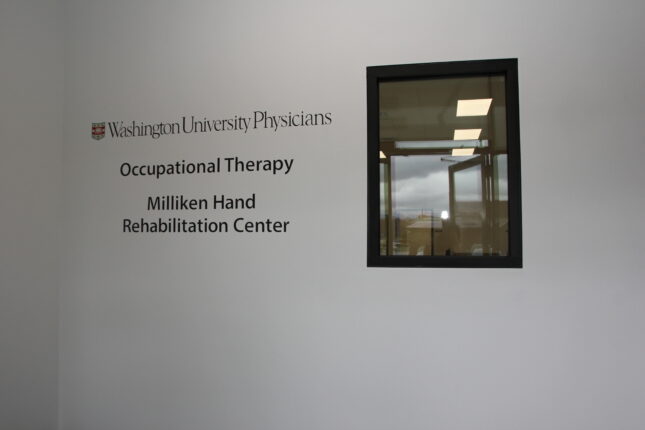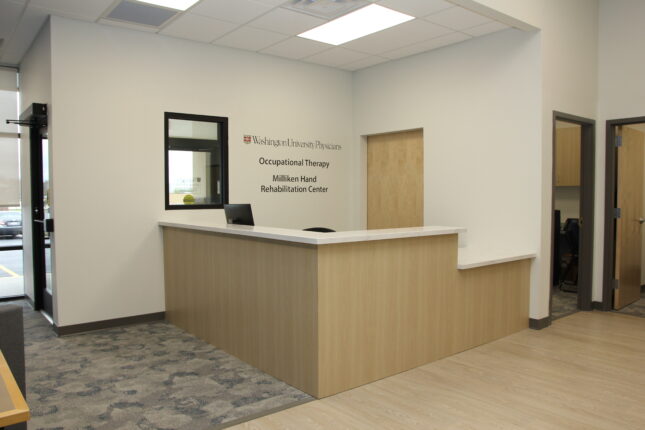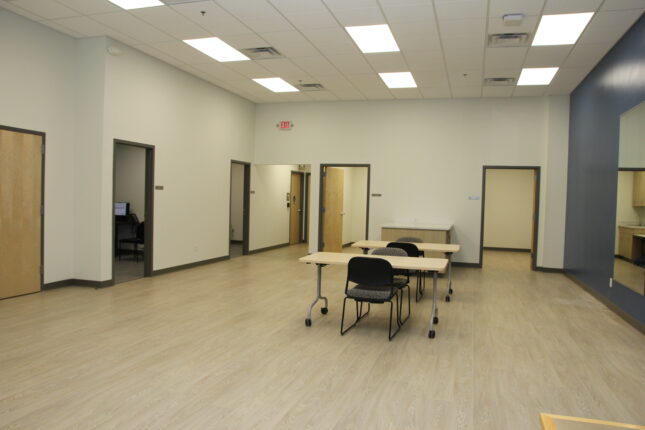Ryan Risley, MPM, meets with contractors just weeks before OT Services’ new clinic in Washington, Mo., is set to open. The 2,500-square-foot space is located approximately 50 miles west of downtown St. Louis in Franklin County. It is the culmination of four years of research, strategizing and planning for Risley, the manager of practice development for the Program in Occupational Therapy’s clinical operations. OT Services therapists will provide general and specialty patient care in the clinic and in home, school, workplace and community settings in Washington and the surrounding area. Risley has not only a professional, but also a personal, stake in the clinic’s future success: Washington is his hometown, and he is fully invested in the health and well-being of his community.
Expansion planning
Risley recalls discussing expanding OT Services’ footprint in his first interview with Pat Nellis, OTD, OTR/L, the director of the Division of Clinical Operations, more than four years ago. “Right off the bat, we discussed what the one-, three- and five-year plan should be for clinical services. One of the five-year goals was to be experiencing growth at a level where we could branch out to another satellite clinic,” Risley says. “Pat is a big proponent of rural communities having access to health-care services, so I conducted competitive market analyses of surrounding counties north, west and south of metro St. Louis.”
Risley dove into key data points such as population growth, demographic data, chronic disease prevalence, insurance provider options, and payment mechanisms. There also had to be future marketing opportunities and economic development in the area. “We wanted to offer that access to health care, but it had to be a solid investment as well. I put together market scorecards for each area to present to Program leadership and discuss which location made the most sense for us. Washington checked all the boxes, even though it is in a competitor’s area. However, they don’t offer the same services that we do,” Risley says. “That being said, we knew we could leverage our existing brand and bring our personalized, one-on-one approach to the area and beyond.”
“Washington University has such a reputation for excellence, and our occupational therapy services are vastly different than what anyone else offers,” adds Nellis. “We’re committed to making sure those living outside our urban reach have access to what we have to offer. Rural Missouri deserves the best, too.”
A hometown perspective
Risley was 4 years old when his family moved to Washington after his father was relocated there for his job and has lived there ever since. He has seen the area go through a period of tremendous growth in recent years.
“In high school, I remember the downtown area being somewhat stagnant. Downtown Washington, Inc., a coalition formed in 1989, had a vision for the town to serve as a center of commerce in Franklin County. Farmland at the main intersection of highways 100 and 44 were sold, and businesses started moving in. Fast-forward to today, and the real estate market is much different . Downtown is booming with commerce, so finding clinic space that fit our needs was a challenge,” Risley recalls.
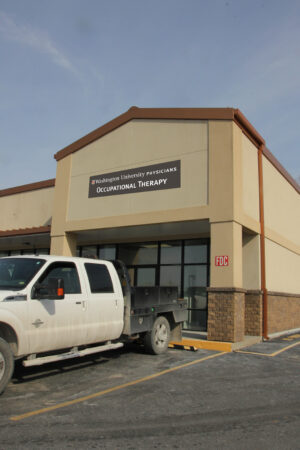
After traveling extensively over the county, Risley eventually found a space for lease in a former sporting goods store situated in a complex adjacent to a Walmart Superstore and next door to a Department of Veterans Affairs Clinic Office with a flat parking lot and spots right by the entrance. In November 2020, he and Nellis presented the pro-forma report to Program leadership and to the Faculty Practice Plan (FPP).
“The original space was 5,000 square feet, but we only needed half of that. We set up meetings with FPP and worked with the Dean’s office to negotiate the lease. Then we started working with the architects and a design group to build out the space. We wanted an open floor plan and treatment space in addition to private rooms for one-on-one and telehealth services. Accessibility was a priority; we want to accommodate all clients, including those with mobility issues. They can park right in front of our clinic and enter without any obstacles,” he says.
Forging partnerships
While finding the right clinic space was certainly a priority, so was forging partnerships with local community providers and organizations to promote the clinic and its services.
“I met with the Franklin County Health Department, the Franklin County Community Resource Board, assisted living facilities, and area physicians to name a few,” Risley says. “Another health-care system has been firmly planted in the area for decades, but my approach has always been to offer our services as another option for providers and patients. Therapy, especially at the beginning, can require two or three appointments a week. We may be able to see the patient sooner, or the clinic might be easier to access. We’re here to serve the community in whatever way we can.”
Risley anticipates that the expertise of Milliken Hand Rehabilitation Center therapists will serve the needs of people who have experienced a work injury or the effects of aging. “Washington and the surrounding area are home to many manufacturing and agricultural industries. I’ve met with several workers’ comp physicians who see patients with hand, shoulder and upper extremity injuries or who experience ‘wear and tear’ on hands or joints from repetitive tasks. Hand function also decreases with age due to rheumatoid arthritis, osteoporosis and even Parkinson’s disease. Our therapists provide services to address and support all of these conditions.”
The move to Washington is also an opportunity to expand existing community partnerships. Pediatric therapist Karen Balk, MOT, OTR/L, will provide services to families with school-aged children, and Katie Bogan, OTD, OTR/L, will be able to use the clinic as a base for early intervention services through the state’s First Steps program for children from birth to 3 years of age who have disabilities or developmental delays. Aging Ahead, which supports older adults and their caregivers, provides programming in senior centers throughout the area. “We are already connected with Aging Ahead in the St. Louis region, and they are interested in working with us in Franklin County,” says Risley, who attends the agency’s monthly meetings. “The Four Rivers YMCA will be hosting their annual adult literacy event; we plan to be a part of it.”
Open for business
The Washington clinic officially opens its doors on April 11. Several existing patients who drove to other locations for care are now able to schedule their visits closer to home. Therapists Stacy Baker, MS, OTR/L, CHT, and Jill Jonas, MSOT, OTR/L, who also live in the area, are looking forward to seeing familiar faces and meeting new patients.
“Patients I’m currently treating at our Milliken Hand Rehabilitation Center Chesterfield location are eager to come see me at our new Washington clinic because it is closer to their homes, and they appreciate that,” Baker says.
Risley is already planning to bring the latest service line to the Washington clinic. “We now have therapists providing support, recovery, and rehab services for COVID ‘long haulers’ that address lasting effects such as fatigue, brain fog, and task management. Jamie Archer, MOT, OTR/L, and Debbie Turley, OTR/L, are already seeing clients in St. Louis; I imagine those services will be needed in Washington as well,” Risley says. “I’ve long referred to occupational therapists as ‘the engineers of the healthcare field.’ They provide solutions so people can manage their health and get back to the activities they want and need to do. I’m proud to bring our therapists to the Washington community.”
Photos of new clinic in Washington, MO
